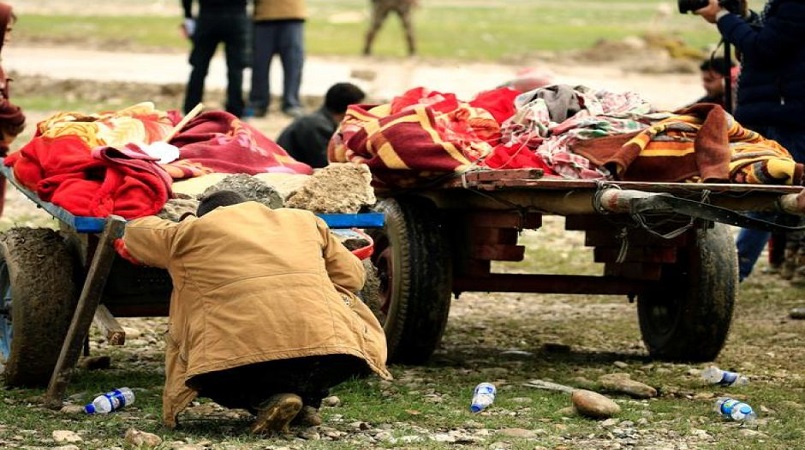
The US military has confirmed coalition aircraft bombed a location in the Iraqi city of Mosul where residents and officials say dozens of civilians were killed as a result of an air strike.
US Central Command, which oversees US military Middle East operations, said the request for the strike came from the Iraqi security forces and struck ISIS fighters and equipment.
Australia is one of the coalition partners conducting air strikes against suspected ISIS targets in Mosul, and the ABC has asked the Australian Defence Force to confirm Australian aircraft were not involved in the incident.
Civil Defence chief Brigadier Mohammed Al-Jawari said rescue teams had recovered 40 bodies and that many others lay buried in the rubble.
A formal investigation into the incident has now begun.
If the alleged number of people killed is confirmed, this incident could be the highest civilian death toll from a single air strike incident in more than 15 years.
The incident occurred on March 17 but what exactly happened is still unclear as IS militants fight to defend the areas of the city they still control.
Iraqi civil defence agency officials and locals say dozens of civilians were buried in collapsed buildings in the Al Jadidah neighbourhood after an air strike against Islamic State triggered a massive explosion.
In a statement, the coalition maintained their forces took reasonable precautions during the planning and execution of air strikes to reduce the risk of harm to civilians.
"Our goal has always been for zero civilian casualties, but the coalition will not abandon our commitment to our Iraqi partners," the statement said.
Lise Grande, the United Nations humanitarian coordinator for Iraq, said the UN is "stunned" by the terrible loss of life and that "everything must be done to avoid civilian casualties".
"International humanitarian law is clear. Parties to the conflict — all parties — are obliged to do everything possible to protect civilians," Ms Grande said in a statement.
"This means that combatants cannot use people as human shields and cannot imperil lives through indiscriminate use of fire-power."
Jihadists hiding among civilians
In a refugee camp just south of Mosul, the ABC spoke with Ahmad, who had just fled the west of the city.
His 21-year-old sister Ghofran, her two children and her husband were sheltering in the Al Jadidah neighbourhood.
Ahmad had not heard from her since the day of the air strike and he was concerned they may be among those killed.
"We just want the authorities to tell us if they are dead or alive," he said.
He said the jihadists had been deliberately hiding among civilians and the coalition needed to be more careful.
"In many of the neighbourhoods they are bombing, more families are being killed than fighters," Ahmad said.
Combat halted to talk new tactics
Late Saturday, a spokesperson for the Iraqi Government forces said they had "paused" their push to recapture western Mosul because of the high rate of civilian casualties.
The Iraqi Observatory for Human Rights said that since the campaign on western Mosul began on February 19, unconfirmed reports said nearly 700 civilians had been killed by government and coalition air strikes or Islamic State actions.
"The recent high death toll among civilians inside the Old City forced us to halt operations to review our plans," the spokesperson said.
"It's a time for weighing new offensive plans and tactics. No combat operations are to go on."
The US-backed offensive to drive IS out of Mosul, now in its sixth month, has managed to recapture the entire eastern side of Mosul and about half of the west.
But in the past two weeks, advances have stuttered as the fighting has entered the narrow alleys of the Old City.
"We need to make sure that taking out Daesh [Islamic State] from the Old City will not cost unwanted high casualties among civilians," the spokesperson said.
"We need surgical, accurate operations to target terrorists without causing collateral damage among residents."
